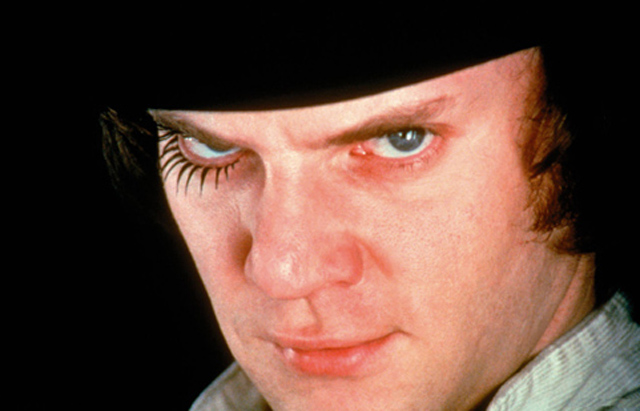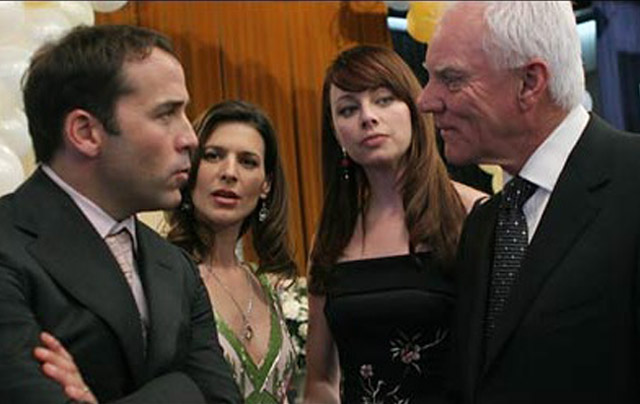CHICAGO – In anticipation of the scariest week of the year, HollywoodChicago.com launches its 2024 Movie Gifts series, which will suggest DVDs and collections for holiday giving.
Interview: Malcolm McDowell on the Clockworks of His Career
CHICAGO – Malcolm McDowell will probably be best remembered for his rebellious breakout as a young star, with his one-of-a-kind performances in “If…,” “A Clockwork Orange” and “O Lucky Man!,” but the distinct character actor has been working ever since.
McDowell exemplified the British rebel image of the late 1960s when he made his debut in “If…” (1968). The character of Mick Travis caught the attention of director Stanley Kubrick, who cast McDowell into his most memorable role, as Alex DeLarge in “A Clockwork Orange” (1971). McDowell then worked steadily throughout the 1970s, making such films as “Voyage of the Damned,” the infamous “Caligula” and “Time After Time.” He has since carved out a character role niche, playing mostly villainous types but also creating noteworthy characters like Dr. Tolian Soran in “Star Trek: Generations” (1994) and Terrence McQuewick in HBO’s “Entourage.”
Malcolm McDowell recently made an appearance in Chicago at the Flashback Weekend, a prominent horror convention, and introduced A Clockwork Orange at the Hollywood Palms cinema in Naperville, Illinois. He sat down for a career overview with HollywoodChicago.com, and posed for photographer Joe Arce.
Photo credit: Joe Arce of Starstruck Foto for HollywoodChicago.com |
HollywoodChicago.com: When you first started out, what was it about that era in the 1960s and your attitude that matched perfectly with the type of films that you were chosen for?
Malcolm McDowell: Actors are chameleons. If it had been any other time, like big band swing, I would have been a big band swinger. At that time, it was fashionable to be a rebel, so being the good chameleon that I was, I said I could do that and be a rebel. I suppose my face at the time had an indolent quality to it, I don’t know what else to say about that, except I rarely get to play ‘the good guy,’ which has been a blessing. Good guy careers are quite short, us heavies can go on until we drop.
HollywoodChicago.com: What do your remember about your first film set? Did you learn anything there that served you well going forward?
McDowell: Yes, because the first film I did was a classic called ‘If…’ It was directed by a genius named Lindsay Anderson, who was the greatest director I ever worked with since. I made three films with him, and he only made five. He was a teacher, mentor and an extraordinary great friend. I had the best first film. So when I came to work for the likes of Stanley Kubrick after that, there was no intimidation because I had worked with the best. I just instinctively knew, even though Stanley was one of the greatest directors that has ever been in this business. Lindsay Anderson was just as good, even though he only made five movies, he was a true auteur.
Stanley was a auteur in a different way, he always had somebody else write his scripts, but his genius is that he took every single genre of movie and made a classic within that genre. He took science fiction and made a millennium jump, because before “2001, A Space Odyssey” it was Flash Gordon and cardboard sets.
HollywoodChicago.com: Your willingness to be free as an actor was certainly evident in ‘A Clockwork Orange.’ In your collaboration with Stanley Kubrick, what scenes or moments in particular during the production did he need to prod you to go even further in that freedom, or did you just instinctively know how to do it?
McDowell: Stanley always loved over-the-top acting. And if you look at his films, there are a lot of caricatures. I told him that I had watched his movies, and I knew what is what, but I had never seen any movie that he had done where the character was in every frame. I can’t do that. If I started chewing scenery from the first frame of that movie then there was no where to go. He wasn’t interested on how I got to it, he just wanted it. He would say, ‘I need a little magic here, give me a little something.’ I would say, ‘what, what do you want me to do?’ It would just be ‘give me something.’ That was the way he talked so of course I would rack my brain to get to that something.
The great moments in A Clockwork Orange are improvisation. And those are the moments that will live forever. The ‘Singin’ in the Rain’ part was an improv. That saved his ass, my ass and the film’s ass. It was a moment of sheer luck.
 Photo credit: Warner Bros. Pictures |
HollywoodChicago.com: You made the move to Hollywood and American pictures with ‘Time After Time.’ What was behind that decision, and what do you continue to find different between a British film set and an American one?
McDowell: Well, they both speak English. [laughs] That’s the good news. The biggest difference is that an American budget spends a little more on food. The lunches are a better quality. Other than that, the working is the same.
I moved to Hollywood after Time After Time because I broke a cardinal rule – I fell in love with the leading lady [Mary Steenburgen, McDowell’s ex-wife]. We married, had two children, and lived unhappily ever after. That is why I stayed in America, I didn’t want to leave my children without a father. There was no decision about leaving England about taxes or my career, I simply wanted to be a father to my kids.
HollywoodChicago.com: I get the feeling that the infamous cult film ‘Caligula’ was taken from the original concept to a new realm by the end. What was your reaction when you saw what they had done to it, and have there been any other films that you’ve done where you thought it was one thing, and ended up being something else?
McDowell: Well, you would have to be really stupid not to understand what they were doing in Caligula, because we knew they were going to do something. Bob Gucionne [Founder of Penthouse Magazine, producer of Caligula], if nothing else, was certainly predictable. To have insets of hard porn didn’t make me angry, it made me laugh. It was just so stupid. As if anyone would be taken in by that. But of course they were, because a hard d*ck is a hard d*ck, right? [laughs] People love to see porn, it doesn’t matter. It just made me laugh.
I was looking at it from a completely different angle, while everyone else was saying ‘look at these name actors in a movie with lesbians making out!’ One of my sons, when he was 12 years old, told me that his friends and he went to a video store, and as always happens found themselves in the porn section, and then he said ‘You’re in it!’ I replied, ‘Yeah, and I’m proud of it.’
HollywoodChicago.com: You famously narrated the first comprehensive documentary about the Fab Four, The Compleat Beatles. What do The Beatles mean personally to you, and the generation that were contemporaries of their influence on society? Had you personally met or known any of them?
McDowell: Yes, I met them, but didn’t know John, even though he was the one that I had the most connection to, from the terms of the work. I was from Liverpool, and wandered into The Cavern back in those days [club where The Beatles began in Liverpool] and watched a group called ‘The Silver Beatles,’ as they were called then. They blew me away so much, that I went back every Friday night to see them. After about six weeks, they became ‘The Beatles,’ the word Silver had been painted off the drum. And they were suddenly in suits. Before that, John was in Winklepickers [Beatle Boot], tight pants, long velvet jacket and a D.A. haircut. The Cavern was no bigger than this space here [indicating a 25 by 50 ft. area], and 150 people at the most would get in there for a performance. It was so small and so jammed that a new dance was created called ‘The Stomp.’ You just hopped from one foot to another, straight up and down.
What I will say, that because The Beatles were from the provinces, they changed that English attitude ‘London and the rest.’ London as the be all and end all. If you were an artist, actor or singer you moved to London. When they made it in London, it made it possible for people from the provinces to break out and become something. It was really important.
 Photo credit: Ron Batzdorff for HBO |
HollywoodChicago.com: You’ve played so many types of characters and roles. Which individual character did you learn the most about yourself, when doing the research and indulging in it? Was it something you did when you were younger or later in your career?
McDowell: It was the first performance that I learned so much, because I had never seen myself on a screen. It was a hell of a shock, I hated it and was traumatized. They wouldn’t let me see the dailies after awhile because I wanted to re-shoot everything. I learned that every single moment you have to be in control of the muscles in your face and every movement on screen. Movies are about movement, it is as important as the spoken word.
HollywoodChicago.com: You’ve seen cinema and popular culture rise from the 1960s to the present, and have virtually lived through it. Do you see a direct relationship between popular culture and our personality as a society? Has popular culture enhanced or distracted our lives?
McDowell: Of course we are what we are. We cannot divorce society from the art and what we do, the music, the films, it’s all part of the structure of our society. Like A Clockwork Orange, to take a poignant film that we talked about, spawned a social shift, which we didn’t know at the time, it was the beginnings of the punk movement…dress, hair, make-up and anarchy.
You look at the recent riots in England, and I thought so what, they’ve been rioting in London for centuries. Just read the history books, they used to turn over the monarch’s carriage and pelt him with tomatoes. It’s the same thing, just the mob mentality. When parents lose the ability to be really on top of it with their kids, then anything can happen. And I’ve got enough kids to know that.
 | By PATRICK McDONALD |


